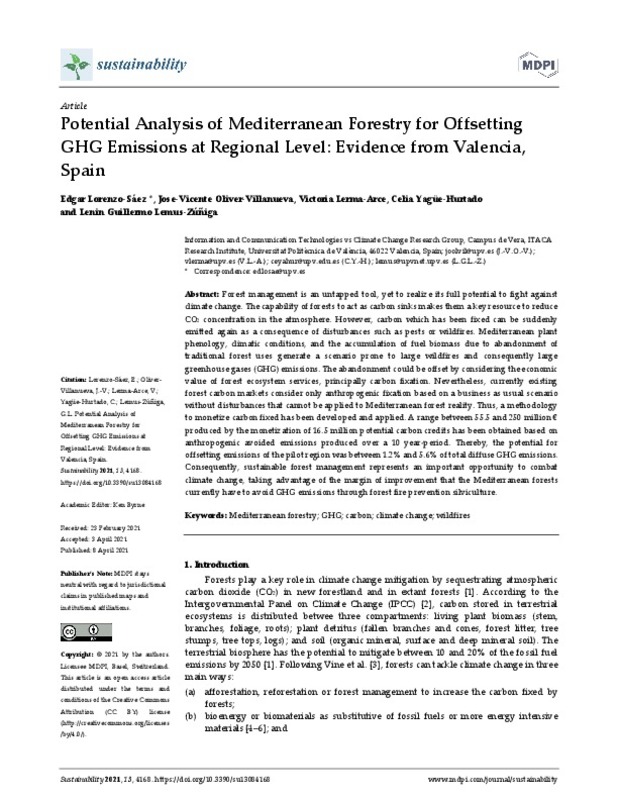JavaScript is disabled for your browser. Some features of this site may not work without it.
Buscar en RiuNet
Listar
Mi cuenta
Estadísticas
Ayuda RiuNet
Admin. UPV
Potential Analysis of Mediterranean Forestry for Offsetting GHG Emissions at Regional Level: Evidence from Valencia, Spain
Mostrar el registro sencillo del ítem
Ficheros en el ítem
| dc.contributor.author | Lorenzo-Sáez, Edgar
|
es_ES |
| dc.contributor.author | Oliver Villanueva, José Vicente
|
es_ES |
| dc.contributor.author | LERMA ARCE, VICTORIA
|
es_ES |
| dc.contributor.author | Yagüe-Hurtado, Celia
|
es_ES |
| dc.contributor.author | Lemus Zúñiga, Lenin Guillermo
|
es_ES |
| dc.date.accessioned | 2022-04-27T10:07:07Z | |
| dc.date.available | 2022-04-27T10:07:07Z | |
| dc.date.issued | 2021-04 | es_ES |
| dc.identifier.uri | http://hdl.handle.net/10251/182180 | |
| dc.description.abstract | [EN] Forest management is an untapped tool, yet to realize its full potential to fight against climate change. The capability of forests to act as carbon sinks makes them a key resource to reduce CO2 concentration in the atmosphere. However, carbon which has been fixed can be suddenly emitted again as a consequence of disturbances such as pests or wildfires. Mediterranean plant phenology, climatic conditions, and the accumulation of fuel biomass due to abandonment of traditional forest uses generate a scenario prone to large wildfires and consequently large greenhouse gases (GHG) emissions. The abandonment could be offset by considering the economic value of forest ecosystem services, principally carbon fixation. Nevertheless, currently existing forest carbon markets consider only anthropogenic fixation based on a business as usual scenario without disturbances that cannot be applied to Mediterranean forest reality. Thus, a methodology to monetize carbon fixed has been developed and applied. A range between 55.5 and 250 million euro produced by the monetization of 16.5 million potential carbon credits has been obtained based on anthropogenic avoided emissions produced over a 10 year-period. Thereby, the potential for offsetting emissions of the pilot region was between 1.2% and 5.6% of total diffuse GHG emissions. Consequently, sustainable forest management represents an important opportunity to combat climate change, taking advantage of the margin of improvement that the Mediterranean forests currently have to avoid GHG emissions through forest fire prevention silviculture. | es_ES |
| dc.description.sponsorship | This research was funded by EIT Climate KIC in the frame of the ValVolCar project and by Interreg SUDOE REMAS project (SOE3/P4/E0954), project co-financed by the Interreg Sudoe Program through the European Regional Development Fund (ERDF). | es_ES |
| dc.language | Inglés | es_ES |
| dc.publisher | MDPI AG | es_ES |
| dc.relation.ispartof | Sustainability | es_ES |
| dc.rights | Reconocimiento (by) | es_ES |
| dc.subject | Mediterranean forestry | es_ES |
| dc.subject | GHG | es_ES |
| dc.subject | Carbon | es_ES |
| dc.subject | Climate change | es_ES |
| dc.subject | Wildfires | es_ES |
| dc.subject.classification | INGENIERIA AGROFORESTAL | es_ES |
| dc.subject.classification | ARQUITECTURA Y TECNOLOGIA DE COMPUTADORES | es_ES |
| dc.subject.classification | PROYECTOS DE INGENIERIA | es_ES |
| dc.title | Potential Analysis of Mediterranean Forestry for Offsetting GHG Emissions at Regional Level: Evidence from Valencia, Spain | es_ES |
| dc.type | Artículo | es_ES |
| dc.identifier.doi | 10.3390/su13084168 | es_ES |
| dc.relation.projectID | info:eu-repo/grantAgreement/EC//SOE3%2FP4%2FE0954/EU/Gestión del riesgo de emisiones de gases de efecto invernadero en incendios forestales/ | es_ES |
| dc.rights.accessRights | Abierto | es_ES |
| dc.contributor.affiliation | Universitat Politècnica de València. Departamento de Proyectos de Ingeniería - Departament de Projectes d'Enginyeria | es_ES |
| dc.contributor.affiliation | Universitat Politècnica de València. Departamento de Ingeniería Rural y Agroalimentaria - Departament d'Enginyeria Rural i Agroalimentària | es_ES |
| dc.contributor.affiliation | Universitat Politècnica de València. Departamento de Informática de Sistemas y Computadores - Departament d'Informàtica de Sistemes i Computadors | es_ES |
| dc.description.bibliographicCitation | Lorenzo-Sáez, E.; Oliver Villanueva, JV.; Lerma Arce, V.; Yagüe-Hurtado, C.; Lemus Zúñiga, LG. (2021). Potential Analysis of Mediterranean Forestry for Offsetting GHG Emissions at Regional Level: Evidence from Valencia, Spain. Sustainability. 13(8):1-17. https://doi.org/10.3390/su13084168 | es_ES |
| dc.description.accrualMethod | S | es_ES |
| dc.relation.publisherversion | https://doi.org/10.3390/su13084168 | es_ES |
| dc.description.upvformatpinicio | 1 | es_ES |
| dc.description.upvformatpfin | 17 | es_ES |
| dc.type.version | info:eu-repo/semantics/publishedVersion | es_ES |
| dc.description.volume | 13 | es_ES |
| dc.description.issue | 8 | es_ES |
| dc.identifier.eissn | 2071-1050 | es_ES |
| dc.relation.pasarela | S\432752 | es_ES |
| dc.contributor.funder | European Regional Development Fund | es_ES |
| dc.contributor.funder | COMISION DE LAS COMUNIDADES EUROPEA | es_ES |
| dc.subject.ods | 13.- Tomar medidas urgentes para combatir el cambio climático y sus efectos | es_ES |
| dc.subject.ods | 15.- Proteger, restaurar y promover la utilización sostenible de los ecosistemas terrestres, gestionar de manera sostenible los bosques, combatir la desertificación y detener y revertir la degradación de la tierra, y frenar la pérdida de diversidad biológica | es_ES |
| upv.costeAPC | 2000 | es_ES |








